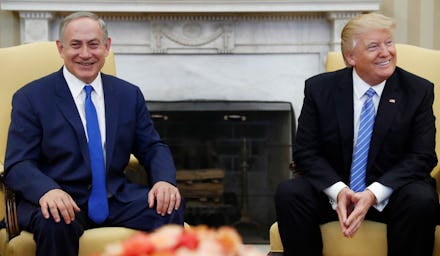Here's why Trump's ambivalence about a two-state solution for Israel and Palestine matters

For decades, American policy toward Israel and Palestine has centered around the notion that the only way to create lasting peace in the Middle East is to create one state for Israelis and one for Palestinians — the so-called "two-state solution." But, as of late, President Donald Trump appeared to back away from that approach.
At a press conference on Feb. 15 with Israeli Prime Minister Benjamin Netanyahu, Trump said, "I thought for a while the two-state looked like it may be the easier of the two but honestly, if Bibi and if the Palestinians — if Israel and the Palestinians are happy, I'm happy with the one they like the best."
One state or two?
Reactions were, predictably, mixed. In Gaza, Palestinians reacted with "anger and bafflement," the New York Times reported. The Palestinians' chief negotiator, Saeb Erekat, called a one-state solution de facto "apartheid," the Times reported, and Hazim Kassim, a spokesman for Hamas, told the outlet, "It is now clear that the U.S. has provided a cover for aggression, occupation and the confiscation of Palestinian land."
In Israel, Netanyahu's far-right Likud party has opposed the two-state solution, preferring instead one, Jewish, state. Netanyahu has backed Israelis who illegally build settlements in Palestinian territory, and his party has sought to retroactively legalize such settlements.
Under President Barack Obama, the United States steadily applied pressure to Israel to stop building new settlements in Palestinian lands, and, with nudging from the U.S., Netanyahu even endorsed a (limited) two-state solution in 2009.
But Trump's ambivalence on the issue means the pressure is off. Abandoning the two-state solution is "another nail in the coffin of the peace process, which already had a lot of nails in it," Martin Indyk, a former Middle East peace negotiator under Obama, told Reuters.
Breakdown of two-state talks could lead to war
A one-state solution could play out in a few different ways. The one favored by Israel's far-right would see Israel annex portions of the West Bank, offering Palestinians who live there now Israeli citizenship.
Another proposed solution would create two political entities with freedom of travel and equal rights for Israelis and Palestinians, a popular proposal among Palestinians but unpopular with Israeli Jews who predict it would mean the end of the Jewish state. If nothing is done, one state might still emerge, as Israeli settlements continue to creep further and further into Palestinian land.
But the end of two-state peace talks could mean the resumption of war. In 2016, then-UN Secretary General Ban Ki Moon said a one-state solution would "spell doom" for both Israel and Palestine. "This is madness," he said. "Replacing a two-state solution with a one-state construct would spell doom: denying Palestinians their freedom and rightful future, and pushing Israel further from its vision of a Jewish democracy towards greater global isolation."